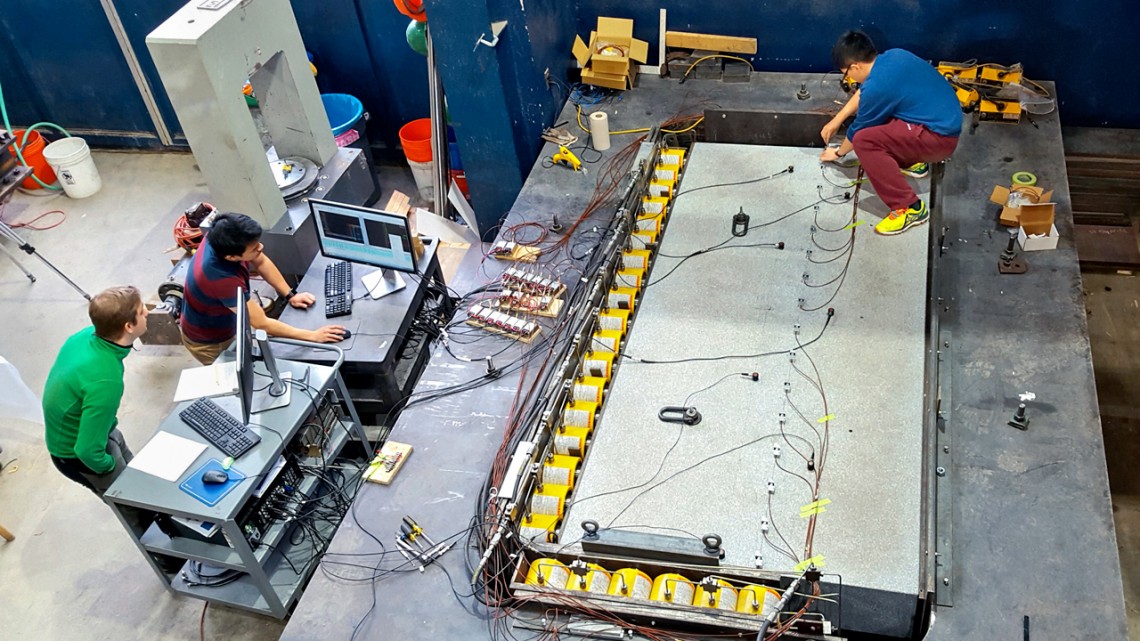
The machine that Gregory McLaskey, assistant professor of civil and environmental engineering, will use in his research into the role of fluids in earthquakes.
Nine assistant professors win NSF early career awards
By Melanie Lefkowitz
Researchers studying the ethical implications of artificial intelligence algorithms, the development of new tools to analyze brain images and the role of fluids in triggering earthquakes are among the nine Cornell faculty members who have received National Science Foundation Faculty Early Career Development Awards.
Over the next five years, each researcher will receive an expected minimum of $400,000 “to build a firm scientific footing for solving challenges and scaling new heights for the nation, as well as serve as academic role models in research and education,” according to the NSF website.
The assistant professors are: Nozomi Ando and Robert DiStasio, Jr., chemistry and chemical biology, Kathryn Mann, mathematics, and Malte Ziewitz, science and technology studies, in the College of Arts and Sciences; Gregory McLaskey, civil and environmental engineering, Mert Sabuncu, in the School of Electrical and Computer Engineering and the Nancy E. and Peter C. Meinig School of Biomedical Engineering, and Andrej Singer, materials science and engineering, in the College of Engineering; Ifeoma Ajunwa, labor and employment law, in the ILR School and Cornell Law School; and Adrian Sampson, computer science, in the Faculty of Computing and Information Science.
Ando, whose lab develops X-ray based tools to study protein motions during catalysis and regulation, will use the funds to explore enzyme regulation through a new approach that includes X-ray scattering, single-particle electron microscopy and computational bioinformatics. She will also develop a modern structural biology course that incorporates active learning, and a career-focused seminar series for students and postdoctoral researchers in science and technology fields.
DiStasio is developing accurate and reliable computer simulation methods to predict the structures and stabilities of molecular crystals – a versatile class of materials with applications in sustainable energy, pharmaceutical research and medicine, as well as technology and industry. DiStasio’s group is also creating an interactive software package to help students of all levels visualize the abstract math concepts encountered in chemistry.
Mann’s award will fund her research into the symmetries of basic mathematical objects called manifolds, and how these objects change under transformation. Her project will employ new techniques to describe and distinguish rigid and unstable behaviors, phenomena that occur in real-world situations ranging from weather patterns and ocean currents to mechanical systems. Mann will also introduce active-learning courses for undergraduate math students, as well as a teaching program for graduate students and a workshop focused on communicating mathematics.
Ziewitz, a Mills Family Faculty Fellow, will study how ordinary people cope with algorithmic systems such as web search engines and credit scoring. Using qualitative, historical and ethnographic methods, Ziewitz will explore what happens when people feel misrepresented by these systems, and what resources they have to change the results. Additionally, a new clinic will offer free services to those negatively affected by automated scoring systems from a multidisciplinary team of students, supervised by faculty.
McLaskey will study the role of fluids in earthquakes, with the goal of improved interpretation of seismic observations such as tremors in order to better assess earthquake risks. To bridge centimeter-scale lab experiments and large field studies, he will carry out 3 meter-scale fault-rupture experiments in a controlled laboratory environment, tracking fluids on the fault plane and monitoring acoustic waves. The award will also support the development of a wooden footbridge building competition, which will engage young people in rural communities in upstate New York.
Sabuncu’s award will fund the development of new machine learning-based tools to analyze brain images, which are complex and challenging to interpret. The project will advance existing artificial intelligence research to address large-scale image analysis. The new tools will then be used to map genetic effects on human brain morphology in UK Biobank data. Sabuncu will also develop relevant educational material for a range of audiences.
Singer will use the award to explore the degeneration and durability of cathodes, which may help improve sodium-ion batteries – a promising means of sustainable energy storage. Singer will use advanced X-ray characterization to view processes inside real, operating batteries at nanometer-scale and in real time. He will also aim to foster diversity in materials science by creating and distributing hands-on experiments to elementary, middle and high school students.
Ajunwa will use her award to explore the development and implementation of automated hiring platforms, which rely on complex formulas and artificial intelligence to make hiring decisions. Her research will survey companies that use automated hiring platforms, observe how they’re designed, and interview designers, human resources professionals and job applicants in order to understand the social and ethical dimensions of how these systems – which have been shown to sometimes be biased – function within the job market.
With his award, Sampson will design new programming tools to meet current trends in computer hardware. Computer systems, from smartwatches to data centers, are increasingly relying on emerging forms of unconventional hardware, such as graphics processing units, but programming languages have lagged behind. Sampson’s project seeks to create new, more flexible and effective programming languages for heterogeneous computer systems, and develop online lessons, seminars and workshops.
Media Contact
Get Cornell news delivered right to your inbox.
Subscribe
